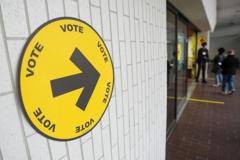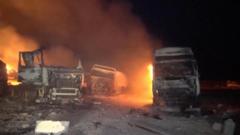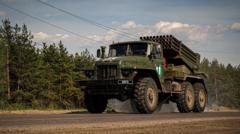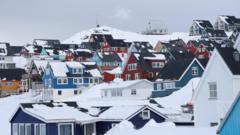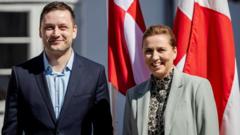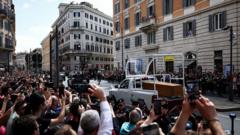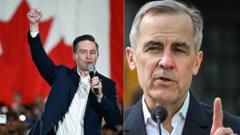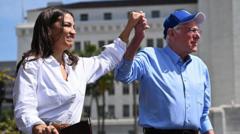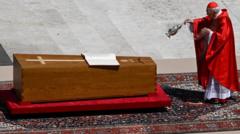The article discusses recent interactions between Donald Trump, Volodymyr Zelensky, and Vladimir Putin, particularly in light of their meeting at Pope Francis's funeral and the ongoing conflict in Ukraine.
Trump Questions Putin's Commitment to Peace After Vatican Meeting with Zelensky

Trump Questions Putin's Commitment to Peace After Vatican Meeting with Zelensky
In a critical social media message, Trump expresses doubts about Putin's intentions following his dialogue with Zelensky.
In a recent post on social media, former U.S. President Donald Trump expressed skepticism regarding Russian President Vladimir Putin's genuine desire to end the war in Ukraine. His comments followed a meeting with Ukrainian President Volodymyr Zelensky at the Vatican, held on the sidelines of Pope Francis's funeral. Trump remarked that he feels Putin might be "tapping me along," particularly after Moscow's recent missile strikes on Kyiv, asserting that there is "no reason for Putin to be shooting missiles into civilian areas."
The 15-minute encounter between Trump and Zelensky was characterized by the White House as "very productive," with Zelensky describing it as potentially "historic." This marks the first direct meeting between the two since a tense Oval Office exchange in February, where Trump had previously told Zelensky that he "didn't have the cards" in negotiations with Russia. In his latest comments, Trump reiterated that Zelensky continues to lack leverage against Russia, even insinuating that Ukraine might need to consider concessions in order to facilitate peace talks.
While Trump has previously claimed that Russia and Ukraine were nearing a deal, the Kremlin announced its openness to direct discussions without preconditions. However, Trump's pessimism about Putin's intentions has raised concerns, suggesting that the Russian leader may not genuinely seek an end to hostilities.
Images of the meeting showed clear engagement between the two leaders, and Ukrainian Foreign Minister Andrii Sybiha highlighted its importance, stating no words could adequately convey the significance of two leaders striving for peace. The backdrop of their interaction included support from UK Prime Minister Keir Starmer and French President Emmanuel Macron, who have served as intermediaries in the conflict.
During the funeral service, the atmosphere remained somber, with calls for peace echoing in Cardinal Battista Re's homily, recalling Pope Francis's repeated exhortations to "build bridges, not walls." While the discussion hinted at the potential for a second meeting, Trump departed Rome immediately, whereas Zelensky continued his diplomatic engagements with European leaders, including Macron and Starmer.
Macron emphasized a shared goal of peace with Trump and noted that Ukraine was ready for an "unconditional ceasefire." Nonetheless, Trump’s historical pressure on Ukraine to consider territorial concessions, particularly regarding Crimea, complicates the dialogue. Zelensky, steadfast in his rejection of such demands, indicated openness to discussion following a full ceasefire. The dynamics of these leaders' negotiations illustrate the intricate web of international diplomacy amid an ongoing crisis.
The 15-minute encounter between Trump and Zelensky was characterized by the White House as "very productive," with Zelensky describing it as potentially "historic." This marks the first direct meeting between the two since a tense Oval Office exchange in February, where Trump had previously told Zelensky that he "didn't have the cards" in negotiations with Russia. In his latest comments, Trump reiterated that Zelensky continues to lack leverage against Russia, even insinuating that Ukraine might need to consider concessions in order to facilitate peace talks.
While Trump has previously claimed that Russia and Ukraine were nearing a deal, the Kremlin announced its openness to direct discussions without preconditions. However, Trump's pessimism about Putin's intentions has raised concerns, suggesting that the Russian leader may not genuinely seek an end to hostilities.
Images of the meeting showed clear engagement between the two leaders, and Ukrainian Foreign Minister Andrii Sybiha highlighted its importance, stating no words could adequately convey the significance of two leaders striving for peace. The backdrop of their interaction included support from UK Prime Minister Keir Starmer and French President Emmanuel Macron, who have served as intermediaries in the conflict.
During the funeral service, the atmosphere remained somber, with calls for peace echoing in Cardinal Battista Re's homily, recalling Pope Francis's repeated exhortations to "build bridges, not walls." While the discussion hinted at the potential for a second meeting, Trump departed Rome immediately, whereas Zelensky continued his diplomatic engagements with European leaders, including Macron and Starmer.
Macron emphasized a shared goal of peace with Trump and noted that Ukraine was ready for an "unconditional ceasefire." Nonetheless, Trump’s historical pressure on Ukraine to consider territorial concessions, particularly regarding Crimea, complicates the dialogue. Zelensky, steadfast in his rejection of such demands, indicated openness to discussion following a full ceasefire. The dynamics of these leaders' negotiations illustrate the intricate web of international diplomacy amid an ongoing crisis.


